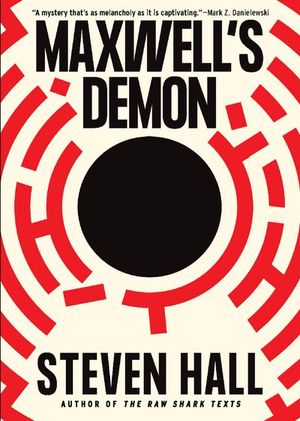Maxwell's Demon
Published by Grove Atlantic
The son of a famous writer is caught in a cat-and-mouse game with his late father’s protégé in this “heady postmodern thriller” (Publishers Weekly).
Thomas Quinn is having a hard time. A failed novelist, he’s stuck writing short stories and audio scripts for other people’s characters. His wife, Imogen, is working on a remote island halfway around the world, and talking to her over the webcam isn’t the same. The bills are piling up, the dirty dishes are stacking in the sink, and the whole world seems to be hurtling towards entropic collapse. Then he gets a voicemail from his father, who has been dead for seven years.
Thomas’s relationship with Stanley Quinn—a world-famous writer and erstwhile absent father—was always shaky, not least because Stanley always seemed to prefer his enigmatic assistant and protégé Andrew Black to his own son. Yet after Black published his first book, Cupid’s Engine, which went on to sell over a million copies, he disappeared completely. Now strange things are happening to Thomas, and he can’t help but wonder if Black is tugging at the seams of his world behind the scenes.
Absurdly brilliant, wildly entertaining, and utterly mind-bending, Maxwell’s Demon triumphantly excavates the ways we construct meaning in a world where chaotic collapse looms closer every day.
Praise for Maxwell’s Demon
Named a Most Anticipated Book by the Guardian
“A wonderfully imaginative, splendidly baroque novel that is a combination of the baffling, teasing, and tantalizing. Part fantasy, part mystery, it is altogether delightful and filled with surprises—in a word, exceptional. No, make that two words; the second is fantastic.” —Booklist (starred review)
“[A] phantasmagoric novel with shades of Stephen King’s The Dark Half. . . . There’s really nothing like this book—long contemplations of philosophy, personality, religion, and history are all woven into something of a mystery in which no one is truly reliable. With influences that recall Fight Club and Motherless Brooklyn, Hall manages to put a whole world on the page that shifts and changes as weirdly and wildly as the ones in the novel’s fictional books. The modern novel’s version of a Möbius strip, written with verve and a vast appreciation for the power of language.” —Kirkus Reviews
“A postmodern literary thriller about a difficult second novel. . . . Anyone who has a taste for postmodern hijinks—fans of Thomas Pynchon or Mark Z. Danielewski’s House of Leaves—will be drawn to the menace and profusion, the game-like brilliance and black hilarity of Maxwell’s Demon.” —Australian
Thomas Quinn is having a hard time. A failed novelist, he’s stuck writing short stories and audio scripts for other people’s characters. His wife, Imogen, is working on a remote island halfway around the world, and talking to her over the webcam isn’t the same. The bills are piling up, the dirty dishes are stacking in the sink, and the whole world seems to be hurtling towards entropic collapse. Then he gets a voicemail from his father, who has been dead for seven years.
Thomas’s relationship with Stanley Quinn—a world-famous writer and erstwhile absent father—was always shaky, not least because Stanley always seemed to prefer his enigmatic assistant and protégé Andrew Black to his own son. Yet after Black published his first book, Cupid’s Engine, which went on to sell over a million copies, he disappeared completely. Now strange things are happening to Thomas, and he can’t help but wonder if Black is tugging at the seams of his world behind the scenes.
Absurdly brilliant, wildly entertaining, and utterly mind-bending, Maxwell’s Demon triumphantly excavates the ways we construct meaning in a world where chaotic collapse looms closer every day.
Praise for Maxwell’s Demon
Named a Most Anticipated Book by the Guardian
“A wonderfully imaginative, splendidly baroque novel that is a combination of the baffling, teasing, and tantalizing. Part fantasy, part mystery, it is altogether delightful and filled with surprises—in a word, exceptional. No, make that two words; the second is fantastic.” —Booklist (starred review)
“[A] phantasmagoric novel with shades of Stephen King’s The Dark Half. . . . There’s really nothing like this book—long contemplations of philosophy, personality, religion, and history are all woven into something of a mystery in which no one is truly reliable. With influences that recall Fight Club and Motherless Brooklyn, Hall manages to put a whole world on the page that shifts and changes as weirdly and wildly as the ones in the novel’s fictional books. The modern novel’s version of a Möbius strip, written with verve and a vast appreciation for the power of language.” —Kirkus Reviews
“A postmodern literary thriller about a difficult second novel. . . . Anyone who has a taste for postmodern hijinks—fans of Thomas Pynchon or Mark Z. Danielewski’s House of Leaves—will be drawn to the menace and profusion, the game-like brilliance and black hilarity of Maxwell’s Demon.” —Australian
BUY NOW FROM
COMMUNITY REVIEWS

